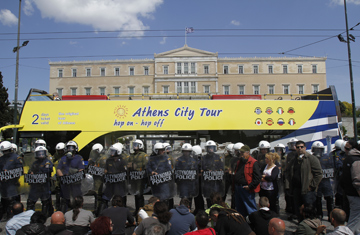
A double-decker tour bus passes Greece's parliament building as riot police form a cordon in front of protesters, during a demonstration in central Athens Wednesday, May 11, 2011.
Konstantinos Sourmelis, a 56-year-old technician for OSE, Greece's state-owned railway, marched to central Athens on Wednesday to send parliament a simple message: Stop selling out the country. Like the thousands of other demonstrators who protested in the country's latest general strike, Sourmelis accuses the government of scapegoating OSE and public utilities as part of its proposed privatization plan, the next in a string of attempts to raise the billions that Greece owes foreign creditors. "In the long run, it's going to hurt workers," says Sourmelis, who makes about $2,000 a month and is worried about losing his job. "I don't see the austerity measures working, so what difference will it make if we sell off our assets? Won't we just be giving away our autonomy for nothing?"
The demonstration on Wednesday was mostly peaceful, though at one point at least three people were injured in clashes between police and left-wing protesters. But Greeks still live with the ghosts of the protests that were held last May, when fringe anarchists firebombed a bank and killed three employees, including a pregnant woman. Earlier that month, Greece's government had received more than $150 billion in loans from the European Union and International Monetary Fund to avoid defaulting on $400 billion in sovereign debt. To get the loan, the government had to introduce tough austerity measures that would hurt in the short term but eventually, it was hoped, put the nation back into the black. At the time, some responded with violence. One year on, most Greeks are still not convinced that the pain will pay off. And neither are the international markets that Greece so badly needs on its side.
The mixture of cuts and tax hikes has succeeded in trimming the deficit by 5% — an impressive performance in a time of recession, economists say. But the austerity measures have also worsened the recession, now in its third year. And because of slumping output and rising unemployment, currently at 15.1%, the markets are still jittery, worried that Greece won't be able to pay back the loans it took out a year ago. European Union leaders had been discussing another bailout for Greece, but are backing off for now. Still, E.U. leaders are international inspectors are pressing Greece to make stronger reforms. "The results of the past year have actually been mixed, with both good and bad developments. The markets react to the debt, which is still high," says George Pagoulatos, a professor of political economy at Athens University of Economics and Business. "We have a long way to go before we recover."
On Monday, the ratings agency Standard & Poor's downgraded Greece's rating again, making it the lowest-rated country in Europe along with Belarus. The move followed a weekend of media speculation around an incendiary — and largely inaccurate — report on the website of German newsweekly Der Spiegel that said Greece was planning to leave the euro zone. European leaders and the Greek government have categorically denied the report, with the Greeks calling it "nearly criminal."
Even if Greece isn't actually thinking of reverting back to the drachma, it has become clear that the country will need some bold moves to raise cash to keep foreign creditors happy. The government is pinning much of its hope on its controversial privatization plan and is also trying to sell or lease the site of the old international airport and some now-abandoned facilities built for the 2004 Olympics. If all goes well, the government could raise about $72 billion by 2015.
But the unions fear privatization could result in job losses. One union leading Wednesday's protests is Genop, which represents the Public Power Corporation (PPC), the state power company. The government wants to reduce its stake in PPC from 51% to 34% but is facing resistance from some of its own deputies in the Panhellenic Socialist Movement, which relies heavily on union support during elections. Genop has threatened to start rolling strikes that could extend into summer, when the country desperately needs to attract tourists to increase revenue.
Prime Minister George Papandreou "has got to find a way to stand up to unions," says Aristides Hatzis, a law professor at the University of Athens who runs the blog The Greek Crisis, which serves as a clearinghouse for reports and commentary on the economic crisis. "He can do it and he must do it. Most Greeks don't want Papandreou to fail — because if he fails, Greece fails."
A year of austerity has already made many Greeks restless. Labor unions, far-left groups and anarchists are promising to fight any new measures, but most Greeks are simply hoping that the reforms work — and that life, if it doesn't get better, at least doesn't get any worse. "People have made a lot of sacrifices and so we want to at least hope that there will be a result," says Yiannis Germanos, an insurance broker involved in the Den Plirono ("We Won't Pay") movement that began with locals disabling toll stations in Afidnes, a town outside Athens, to avoid paying the fares. "But we don't see the light at the end of the tunnel. Will it be five years? Ten years? Are we on the right path?"
